Hi all,
Thank you for joining me for this week’s song, Papa Cuéntame Otra Vez (Papa, tell me again), by Ismael Serrano. If you’d like to hear the song before you read the background, I’ve included a YouTube video below the article.
Below, you’ll find my interpretation of the lyrics (written in italics). Comments and questions are welcome. Please be respectful of others’ opinions if they should differ from yours. Definitions for vocabulary words in bold are provided below. For students of English, there are a couple of questions for you at the end!
The Song
(948 words)
Papa Cuéntame Otra Vez (Papa, tell me again) is a beautiful song written by the Spanish musician, Ismael Serrano, in 1997.
It’s the story of a young man who is talking with his father. He asks him to tell the story again about how he, the father, was in Paris during 1968, the year that the students took over the universities and were, eventually, supported by the unions. Together, the protests and strikes lasted seven weeks.
The song begins by setting the scene. Gendarmes and fascists: gendarmes are the police in France. From the students’ point of view, the police, the university administration, and probably the government itself, were fascists. Students with bangs / that beautiful urban warfare in bellbottom pants and miniskirts / Rolling Stones songs. All of these refer to pop culture during a time of “beautiful warfare,” in other words, when young people took to the streets to fight for what they thought was right. Each pant leg of bellbottom pants was very wide at the bottom, young women often wore miniskirts that were several inches above the knee, and the hairstyle often included bangs over the forehead.
Papa, tell me again all that amused you, destroying the old regime of rusty dictators. This again shows the point of view of the students who fought against those in power. And how you sang “Al vent”. Here, Serrano refers to a song, To the Wind, written in 1959 by the Valencian singer, Raimon. It was a song about the spirit of freedom and was a song encouraging the Spanish people to resist the Franco dictatorship. And how you occupied the Sorbonne: Students in Paris in May of 1968 were trying to pressure the university to change the education system. They were tired of old-fashioned ways of teaching in which the teacher stood at the podium and talked on and on. They were tired of having to put up with 1000 students in a lecture hall made for a few hundred. Finally, they were tired of not having any say in their education. They occupied Sorbonne University and took over classrooms.
The days of wine and roses was the title of a film in 1962. In the film, the main character, Joe Clay, has a problem with alcohol. He meets a woman, Kirsten, they fall in love, marry, and have a little girl. She doesn’t drink at first, but begins to drink socially and then develops the same problem. The relationship goes through twists and turns, and they end their relationship. In the end, Joe decides to stop drinking and tells Kirsten that he will take her back if she stops drinking. The film ends on a hopeful note. The theme from the movie won an Academy Award.
Papa, tell me again that beautiful story about the crazy guerrilla that they killed in Bolivia. The guerrilla is to Ernesto “Che” Guevara, a doctor and rebel who assisted Castro in overthrowing the Cuban dictatorship in order to bring education and healthcare to the people of Cuba. Guevara was captured and killed in Bolivia in 1967. The revolutionary Che became an icon of rebellion for many young people during the 1960s.
And whose gun no one has picked up since means that there has been no one who has tried to do the things that Che was able to do - to stand up to a corrupt government (from his viewpoint). And how since that day, everything seems uglier. In other words, the young man talking with his father thinks the world has become less hopeful as a result of Che’s capture.
Papa, tell me again, how, after all of the barricades and all of the fists raised in the air, and all of the blood spilled, at the end of the game, you weren’t able to accomplish anything. Here, the singer is almost accusing his father of failing to make change. And there was no sand under the cobblestones. At the time of Paris ’68, the students used a slogan, “There is beach sand under the cobblestones” as they pulled them up from the street in order to make barricades or weapons to throw at the police. The singer says that the people of France were not able to achieve the ideal world represented by that slogan.
The defeat was hard, everything that you dreamed of rotted in the corners covered in cobwebs describes how the defeat looked years later. No one sings “Al Vent” now, there aren’t any crazy ones or pariahs. There are no heroes like Che or protesters in the streets as before. It has to rain even though the plaza (town square) remains dirty. Maybe the singer is trying to say that even though society changes, there are some things that cannot be fixed.
Saint Denis is far away, Saint-Denis was a red light district of Paris from the 1950s through the 1980s.
Jean Paul Sartre is far away, Sartre, a leader of existential philosophy, was an icon to the youth of Paris, representing intellectual freedom, press freedom, and revolutionary politics.
Nonetheless, at times I think that in the end it didn’t matter
the blows keep falling over whoever complains
In other words, if you complain about something, they will find a way to make you silent.
And they continue, the same dead, lost to cruelty
Now they die in Bosnia those who used to die in Vietnam
Years later, Serrano added a verse:
They used to die in Bosnia, now they die in Baghdad
Questions
Which word or words do you like in this passage?
What do you think “beach sand under the cobblestones” might mean/symbolize?
VOCABULARY
fascist - a person who insists on obedience to a powerful leader
regime - a system or government that expects obedience to those in power
rusty - unable to move easily due to old age or disuse
dictator - a ruler with total power over a country
Valencian - a person from the area of Valencia in the eastern part of Spain
resist - struggle or fight back when pressured or attacked
occupy - take control of a settle in a place
podium - a small platform from which a person makes a speech or lecture
have a say in something - have a chance to state one’s opinion and influence policy
guerrilla - a member of a small group that takes part in irregular fighting against a larger group of soldiers
rebel - a person who resists authority or control
overthrow - to put an end to something (ex. a government)
revolutionary - a person who is involved in or promotes political change
uglier - more ugly; an unpleasant appearance
barricades - a barrier or obstacle built across a street in order to prevent others from getting through
accomplish - to complete something successfully
accuse - claim that someone has done something wrong
cobblestone - small stones used to cover road surfaces
slogan - a motto or phrase used by a political movement or other group
represent - to act or speak for someone else
defeat - loss, losing a battle or other contest
rot - to go bad (ex. Over time, old leaves will turn black and rot.)
cobweb - the web a spider makes, especially if it is old and is covered with dust
pariah - a person who is not accepted from society or a group because they are not liked or trusted
red light district - an area of a town containing sex businesses
existential philosophy - a philosophical theory that says the existence of the individual is a free and responsible person who decides their own development through their own actions
For photos of Paris during this time, see:
https://www.nytimes.com/2018/05/05/world/europe/france-may-1968-revolution.html
Students!!!! Chat about this song with me! Get the app:


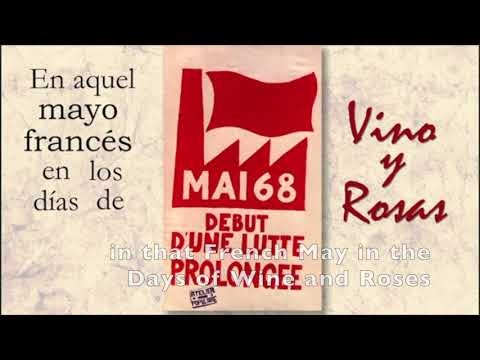


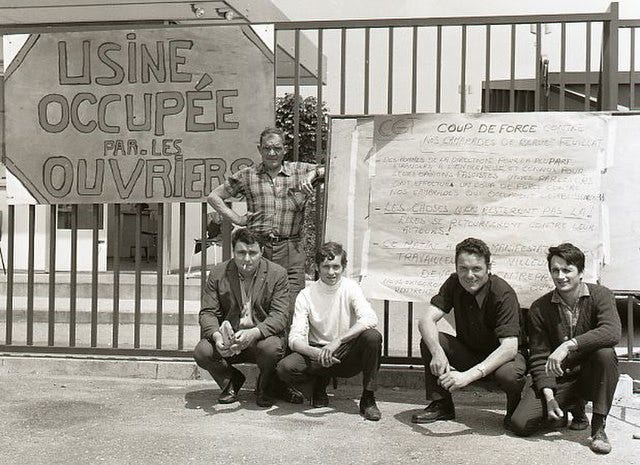

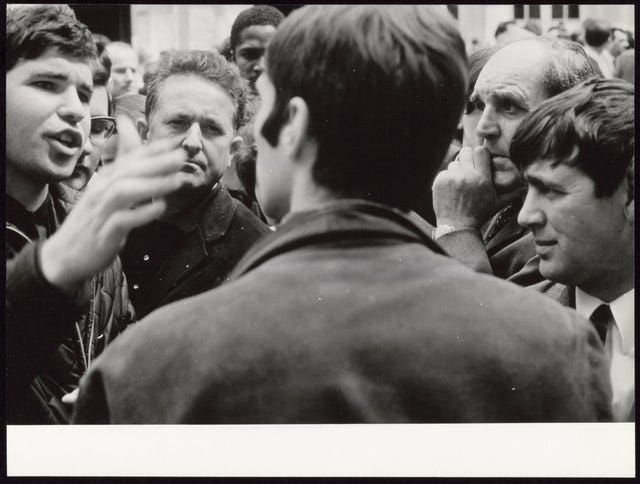
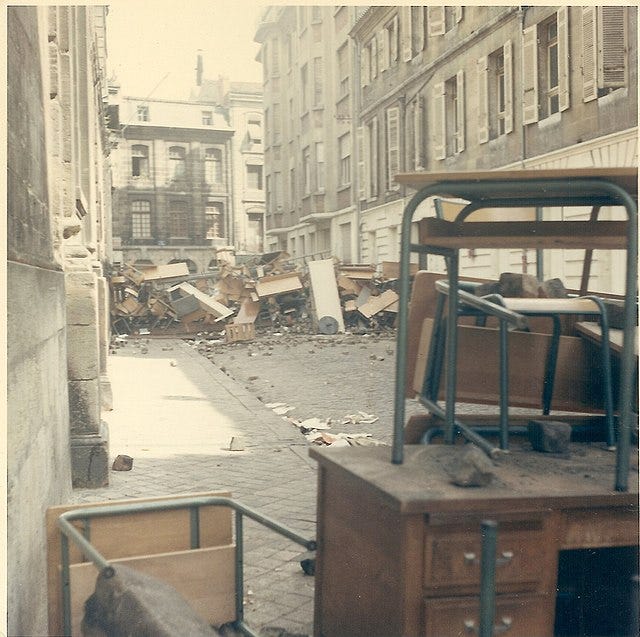

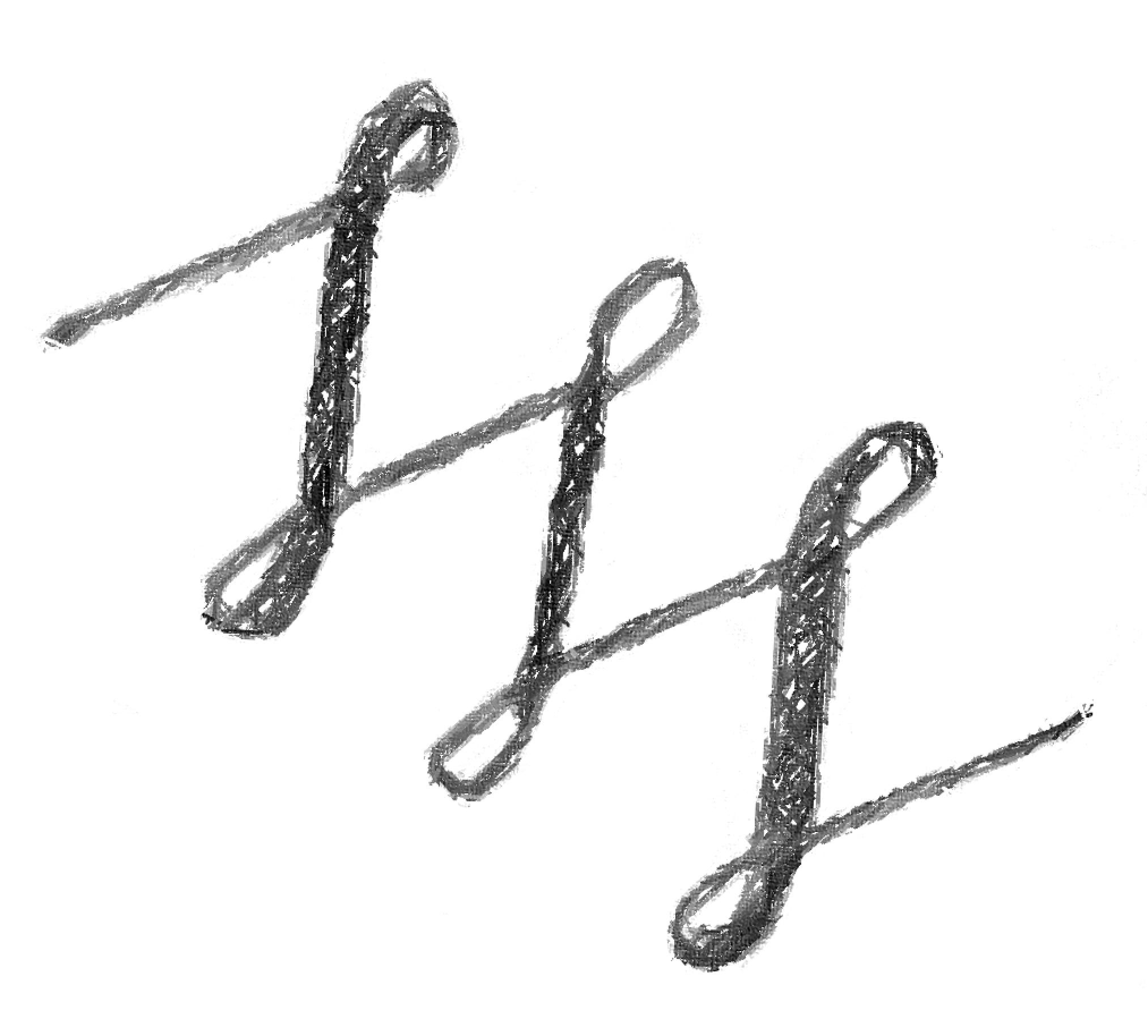
I like to think it DID matter somehow.... I marched in a few protests in my youth...
Nihilism is the shadow side of idealist revolutions, I would argue, and is best looked at clearly as the trap it really is. Do these protests really fail? Demands may not be met, but change happens. There are many players in any current moment. Some questions are answered, others become irrelevant. What would an older Papa sing back to his son? Perhaps there’s another song that balances it and captures the nuances/successes/failures of social change.